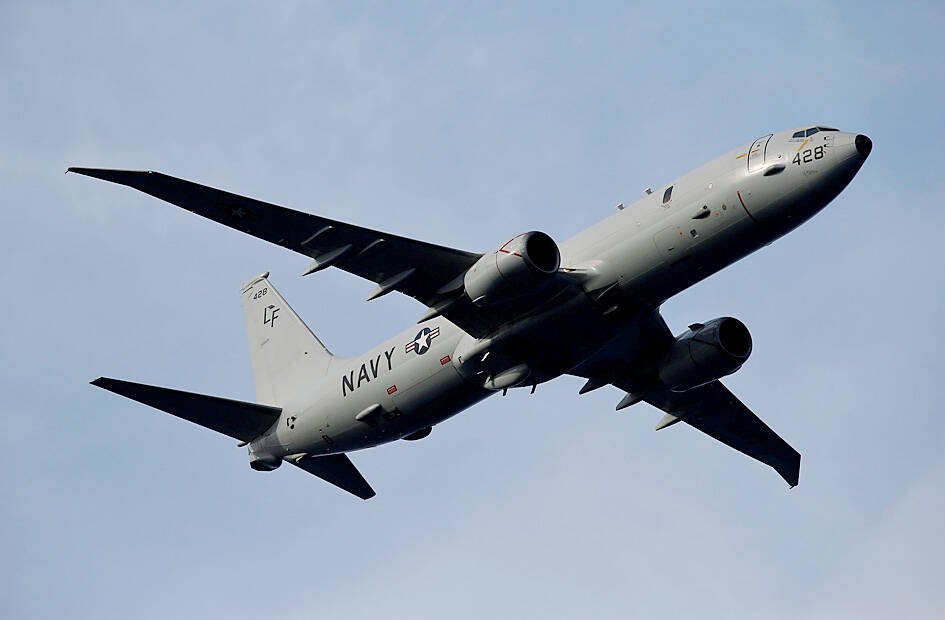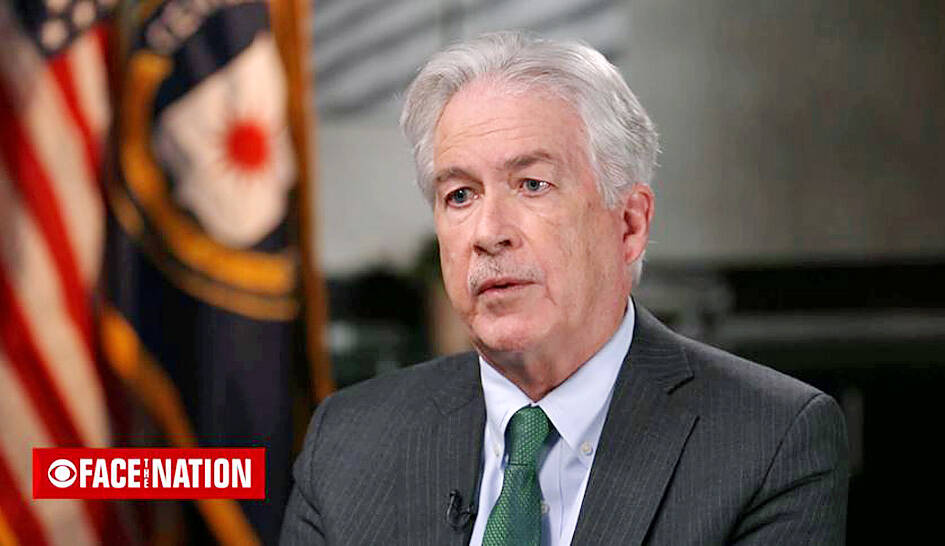A US naval aircraft yesterday made a rare transit through the Taiwan Strait, a flight the US Navy said showed Washington’s “commitment to a free and open Indo-Pacific” region.
The US Navy P-8A Poseidon transited the Taiwan Strait in international airspace, according to a statement released by the 7th Fleet of the US Pacific Command.
“By operating within the Taiwan Strait in accordance with international law, the United States upholds the navigational rights and freedoms of all nations,” the statement said. “The aircraft’s transit of the Taiwan Strait demonstrates the United States’ commitment to a free and open Indo-Pacific.”

Photo: Reuters
In Taipei, the Ministry of National Defense also confirmed the aircraft’s passage, saying in a statement that the military was on top of the situation as a US military aircraft flew northward in the Taiwan Strait yesterday and that it did not see anything out of the ordinary.
US warships have been making routine, almost monthly, passages through the waterway separating Taiwan and China over the past three years as tensions across the Taiwan Strait have escalated, but it is rare for a US warplane to do so.
The last time a US warplane, also a US Navy P-8A Poseidon, flew over the waterway was on June 24 last year, a day after China sent 29 planes into Taiwan’s air defense identification zone — at that point the third-highest daily number since the start of last year.

Photo: screen grab from CBS News
The Boeing P-8 Poseidon is a US maritime patrol and reconnaissance aircraft developed and derived from the civilian Boeing 737-800.
The P-8 Poseidon operates in anti-submarine warfare, anti-surface warfare and intelligence, surveillance and reconnaissance roles.
China yesterday accused the US of “endangering” peace and stability in the Taiwan Strait.
The Eastern Theater Command of the People’s Liberation Army (PLA) said its forces closely monitored the aircraft.
“The US side’s actions deliberately interfered with and disrupted the regional situation and endangered peace and stability in the Taiwan Strait. We firmly oppose this,” it said in a statement.
Meanwhile, CIA Director William Burns said that US intelligence shows that Chinese President Xi Jinping (習近平) has instructed his nation’s military to “be ready by 2027” to invade Taiwan, though he might be harboring doubts about his ability to do so given Russia’s experience in its invasion of Ukraine.
Burns, in a television interview that aired on Sunday, said that the US must take “very seriously” Xi’s desire to ultimately control Taiwan, even if military conflict is not inevitable.
“We do know, as has been made public, that President Xi has instructed the PLA, the Chinese military leadership, to be ready by 2027 to invade Taiwan, but that doesn’t mean that he’s decided to invade in 2027 or any other year as well,” Burns told CBS’ Face the Nation.
“I think our judgement at least is that President Xi and his military leadership have doubts today about whether they could accomplish that invasion,” he said.
Burns said the support from the US and European allies for Ukraine following Russian President Vladimir Putin’s invasion of that nation could be acting as a potential deterrent to Chinese officials, but said the risks of a possible attack on Taiwan would only grow.
“I think, as they’ve looked at Putin’s experience in Ukraine, that’s probably reinforced some of those doubts,” Burns said. “So, all I would say is that I think the risks of, you know, a potential use of force probably grow the further into this decade you get and beyond it, into the following decade as well. So that’s something, obviously, that we watch very, very carefully.”
Additional reporting by Reuters

SECURITY: As China is ‘reshaping’ Hong Kong’s population, Taiwan must raise the eligibility threshold for applications from Hong Kongers, Chiu Chui-cheng said When Hong Kong and Macau citizens apply for residency in Taiwan, it would be under a new category that includes a “national security observation period,” Mainland Affairs Council (MAC) Minister Chiu Chui-cheng (邱垂正) said yesterday. President William Lai (賴清德) on March 13 announced 17 strategies to counter China’s aggression toward Taiwan, including incorporating national security considerations into the review process for residency applications from Hong Kong and Macau citizens. The situation in Hong Kong is constantly changing, Chiu said to media yesterday on the sidelines of the Taipei Technology Run hosted by the Taipei Neihu Technology Park Development Association. With

A US Marine Corps regiment equipped with Naval Strike Missiles (NSM) is set to participate in the upcoming Balikatan 25 exercise in the Luzon Strait, marking the system’s first-ever deployment in the Philippines. US and Philippine officials have separately confirmed that the Navy Marine Expeditionary Ship Interdiction System (NMESIS) — the mobile launch platform for the Naval Strike Missile — would take part in the joint exercise. The missiles are being deployed to “a strategic first island chain chokepoint” in the waters between Taiwan proper and the Philippines, US-based Naval News reported. “The Luzon Strait and Bashi Channel represent a critical access

‘FORM OF PROTEST’: The German Institute Taipei said it was ‘shocked’ to see Nazi symbolism used in connection with political aims as it condemned the incident Sung Chien-liang (宋建樑), who led efforts to recall Democratic Progressive Party (DPP) Legislator Lee Kun-cheng (李坤城), was released on bail of NT$80,000 yesterday amid an outcry over a Nazi armband he wore to questioning the night before. Sung arrived at the New Taipei City District Prosecutors’ Office for questioning in a recall petition forgery case on Tuesday night wearing a red armband bearing a swastika, carrying a copy of Adolf Hitler’s Mein Kampf and giving a Nazi salute. Sung left the building at 1:15am without the armband and apparently covering the book with a coat. This is a serious international scandal and Chinese

COUNTERINTELLIGENCE TRAINING: The ministry said 87.5 percent of the apprehended Chinese agents were reported by service members they tried to lure into becoming spies Taiwanese organized crime, illegal money lenders, temples and civic groups are complicit in Beijing’s infiltration of the armed forces, the Ministry of National Defense (MND) said in a report yesterday. Retired service members who had been turned to Beijing’s cause mainly relied on those channels to infiltrate the Taiwanese military, according to the report to be submitted to lawmakers ahead of tomorrow’s hearing on Chinese espionage in the military. Chinese intelligence typically used blackmail, Internet-based communications, bribery or debts to loan sharks to leverage active service personnel to do its bidding, it said. China’s main goals are to collect intelligence, and develop a